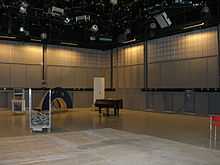Dramatiska Institutet
| Dramatiska Institutet | |
|---|---|
|
The Dramatiska Institutet building in Östermalm | |
| Established | 1970 |
| Students | 155 (FTE, 2009)[1] |
| Location | Stockholm, Sweden |
| Website | http://www.dramatiskainstitutet.se |


| Wikimedia Commons has media related to Dramatiska Institutet. |
Dramatiska Institutet (DI) or University College of Film, Radio, Television and Theatre was a Swedish university college in Stockholm that provided education programs about activities surrounding film, radio, television, and theater.[2][3] It was founded in 1970 by the Swedish government. Many famous media personalities have studied at Dramatiska Institutet, including Josef Fares, Mark Levengood, Stina Lundberg Dabrowski, Anders Lundin, Lukas Moodysson, Kjell Sundvall, and Lisa Siwe.
On January 1, 2011 the school merged with the Swedish National Academy of Mime and Acting to become Stockholm Academy of Dramatic Arts.
Merger
A merger proposal between Dramatiska Institutet and the Swedish National Academy of Mime and Acting was announced in April 2009. In January 2010, the Swedish government formed a committee to work on the merger. 15 million kronor were also divided between the two schools to use on the merger.[3] Tobias Krantz, the Swedish Minister for Higher Education and Research, commented that the fact that "Dramatiska Institutet and the Swedish National Academy of Mime and Acting want to merge together is something I look positively on. If they think that through a merger they can [...] further increase the quality of their educations then that is of course something that the government supports."[3] The new school opened on 1 January 2011.[4]
Controversy
In 2005, criticism was directed at Dramatiska Institutet after a student read an erotic story at the school for a group of six-year-olds as part of a project to see what effect sex has on children. The story involved two young girls having oral sex. This quickly gained attention in the Swedish media and it was labeled "the DI-scandal" in the press. Rector Per Lysander defended Dramatiska Institutet by stating that the story-reading had not been approved by them beforehand. The reading was part of a larger project that involved several professors and students from four schools in Stockholm and that was going to lead to a theater play about children's sexuality.[5]
Soon after the incident gained attention, more controversial experiments that had been made for the project were revealed. As a result, Lysander announced that an investigation had been launched by DI.[6] Bengt Westerberg, an investigator hired by the school, found that the students involved in the project had not discussed ethical questions beforehand and had been given bad guidance from the professors. Lysander announced that the result of this investigation "will lay the foundation for change" at the school.[7]
References
- ↑ Swedish Higher Education Authority (Högskoleverket) - statistics for 2009 (Swedish), page 118
- ↑ List of higher education institutions, Swedish National Agency for Higher Education, accessed 2010-10-26
- ↑ 3.0 3.1 3.2 Mattsson, Andreas (21 January 2010). "Ny kulturhögskola förbereds". Sydsvenskan. Retrieved 26 July 2010.
- ↑ "Kommitté ska förbereda sammanslagningen av Dramatiska institutet och Teaterhögskolan". National Agency for Higher Education. 21 January 2010. Retrieved 26 July 2010.
- ↑ "Porrskildring lästes upp för skolbarn". Sveriges Television. 3 February 2005. Retrieved 26 July 2010.
- ↑ "Måndag 26 juli 2010 hem | kultur & nöje | vetenskap | redaktionen rapport i SVT Play Sverige: Nyheter Fler skolor med i DI:s sexprojekt". Sveriges Television. 5 February 2010. Retrieved 26 July 2010.
- ↑ "DI får kritik i egen utredning". Sveriges Television. 23 March 2005. Retrieved 26 July 2010.
External links
Coordinates: 59°20′21.98″N 18°6′4.68″E / 59.3394389°N 18.1013000°E
